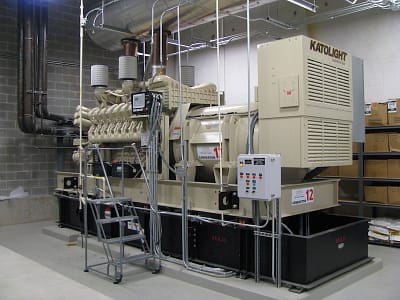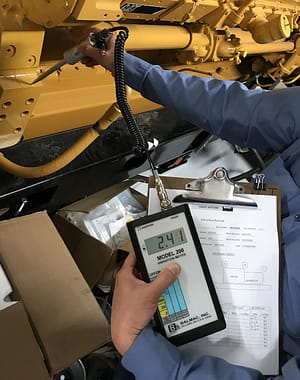We are what we repeatedly do. Excellence, then, is not an act, but a habit.
– Aristotle
When we provide Building Commissioning (Cx) and Total System Balance (TAB) services, attending Factory Witness Testing (FWT) for crucial equipment is frequently a requirement outlined in project specifications. These visits serve as a crucial checkpoint to confirm that the equipment, which will later be installed at the site, conforms to the project specifications and functions as expected.
The Significance of Factory Witness Testing

Our team was tasked with conducting Factory Witness Testing for paralleling switchgear and a generator as part of an update to an Emergency Power Systems (EPS). Before such testing, thoroughly understanding the Project Specifications and the Equipment Submittal is important. This preparation helps identify any potential issues with the equipment under scrutiny.
During the Factory Testing for the generator, our Engineered Air Balance Team reviewed every aspect of the generator setup, including its enclosure and the panelboard within. Notable findings from the system inspection were documented for confirmation and resolution during onsite installation. For instance:
-
- The project specifications required the system to include two sets of batteries and two battery chargers; however, only one set of batteries and one charger were present at the factory.
- The panelboard within the enclosure, intended to support the controller, chargers, and heaters, did not align with the approved project submittal.
- The breakers were mislabeled.
Furthermore, during the Factory Test of the paralleling switchgear, the team could review the entire setup again. A significant discovery was that the gear was constructed for bottom feed, which conflicted with the project’s design for top-feed configuration. Identifying this discrepancy at the factory stage helped limit potential delays in the project.

In another instance, the EAB Test and Balance Team oversaw the Factory Testing of air handling units (AHU) designated for installation in a coastal hospital. The Factory Witness Testing for the AHUs encompassed deflection testing, leakage tests, and unit inspections. It was noted that, contrary to the project specifications which called for 316L stainless steel due to the coastal environment, the AHUs were made from galvanized steel up to the cooling coil section. Recognizing this early on helped mitigate delays.
Another advantage of FWT is witnessing the system operations before they are installed on-site. For the generator detailed above and paralleling switchgear, we observed all necessary alarms as specified in the project specifications, although they were conducted at separate facilities. In checking the alarms on the paralleling switchgear, it was noted that both low and high battery voltage alarms triggered the same alert on the master controller, contrary to the separate alarms outlined in the project specifications.
Factory Witness Testing proves to be a valuable practice, ensuring that systems will perform efficiently and in accordance with the project requirements laid out by the owner and engineers. Ultimately, the primary benefit of Factory Witness Testing lies in its ability to detect system issues early, thus helping to prevent project delays and additional costs.
